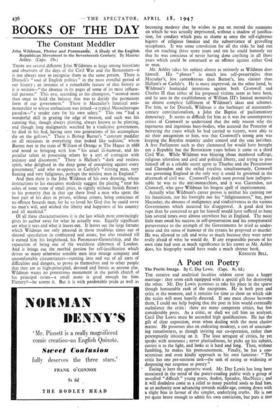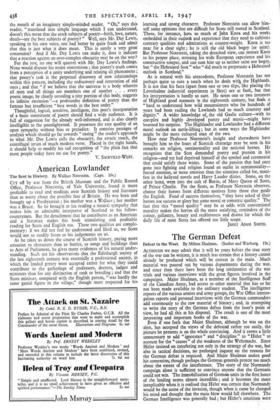A Poet on Poetry
The Poetic Image. By C. Day Lewis. (Cape. 8s. 6d.) THE creative and analytical faculties seldom enter into a happy marriage : they seem each equipped with a special gift for destroying the other. Mr. Day Lewis promises to take his place in the sparse though honourable rank of the exceptions. He is both poet and critic at the moment, and it remains for time to show on which side the scales will most heavily descend. If one must choose between them, I could not help hoping that the poet in him would eventually outbalance the critic: there are many competent critics, but few considerable poets. As a critic, or shall we call him an analyser, Cecil Day Lewis must be accorded high qualifications. He has the gift of clear exposition, even when dealing with the most elusive matter. He possesses also an endearing modesty, a sort of unassum- ing tentativeness, as though inviting our co-operation, rather than peremptorily insisting on it. The least arrogant of critics, he yet speaks with assurance ; never platitudinous, he picks up his subject, carries it to the light, and looks at it hard and long. Then, without fumbling, he makes his pronouncement. Finally, he has a con- scientious and even kindly approach to his own function: " The critic has one pre-eminent task—the task of easing or widening or deepening our response to poetry "
• Easing is here the operative word. Mr. Day Lewis has long been associated in the mind of the poetry-reading public with a group of so-called "difficult" young poets, Auden, Spender, MacNeice ; and it will doubtless come as a relief to many puzzled souls to find him, as an authority now advancing towards midde-age, coming down with a slight bias in favour of the simpler, underlying truths. He is not yet-quite brave enough to admit his own conviction, but puts it into the mouth of an imaginary simple-minded reader. "Oh," says this reader, "translated into simple language which I can understand, doesn't this mean that the stock subjects of poetry—birth, love, nature, deathare the best subjects of poetry? " Well, says Mr. Day Lewis, speaking in his own voice, one had better be quite frank and admit that this is just what it does mean. This is surely a very great concession? And if Mr. Day Lewis can make it, does it indicate that a reaction against an over-complex obscurity may be on the way?
For the rest, no one will quarrel with Mr. Day Lewis's findings. None would dispute his major contentions ; that poetry's truth comes from a perception of a unity underlying and relating all phenomena ; that poetry's task is the perpetual discovery of new relationships within this pattern, including the rediscovery and renovation of old ones ; and that "if we believe that the universe is a body wherein all men and all things are members one of another . . . every poetic image, by clearly revealing a tiny portion of this body, suggests its infinite extension "—a profounder definition of poetry than the famous but insufficient " best words in the best order."
Thoughtful, logical, sensitive, intelligent, this poet's interpretation of a basic constituent of poetry should find a wide audience. It is full of suggestion for the already well-informed, and is also clearly intelligible to the unenlightened. It possesses the rare quality of an open sympathy without bias or prejudice. It contains passages of analysis which should go far towards " easing " the reader's approach to what Mr. Day Lewis calls the obscurity, the erratic touch, the centrifugal strain of much modern verse. Placed in the right hands, it should help to modify his sad recognition of " the plain fact that most people today have no use for poetry." V. SACKVILLE-WEST.



































 Previous page
Previous page